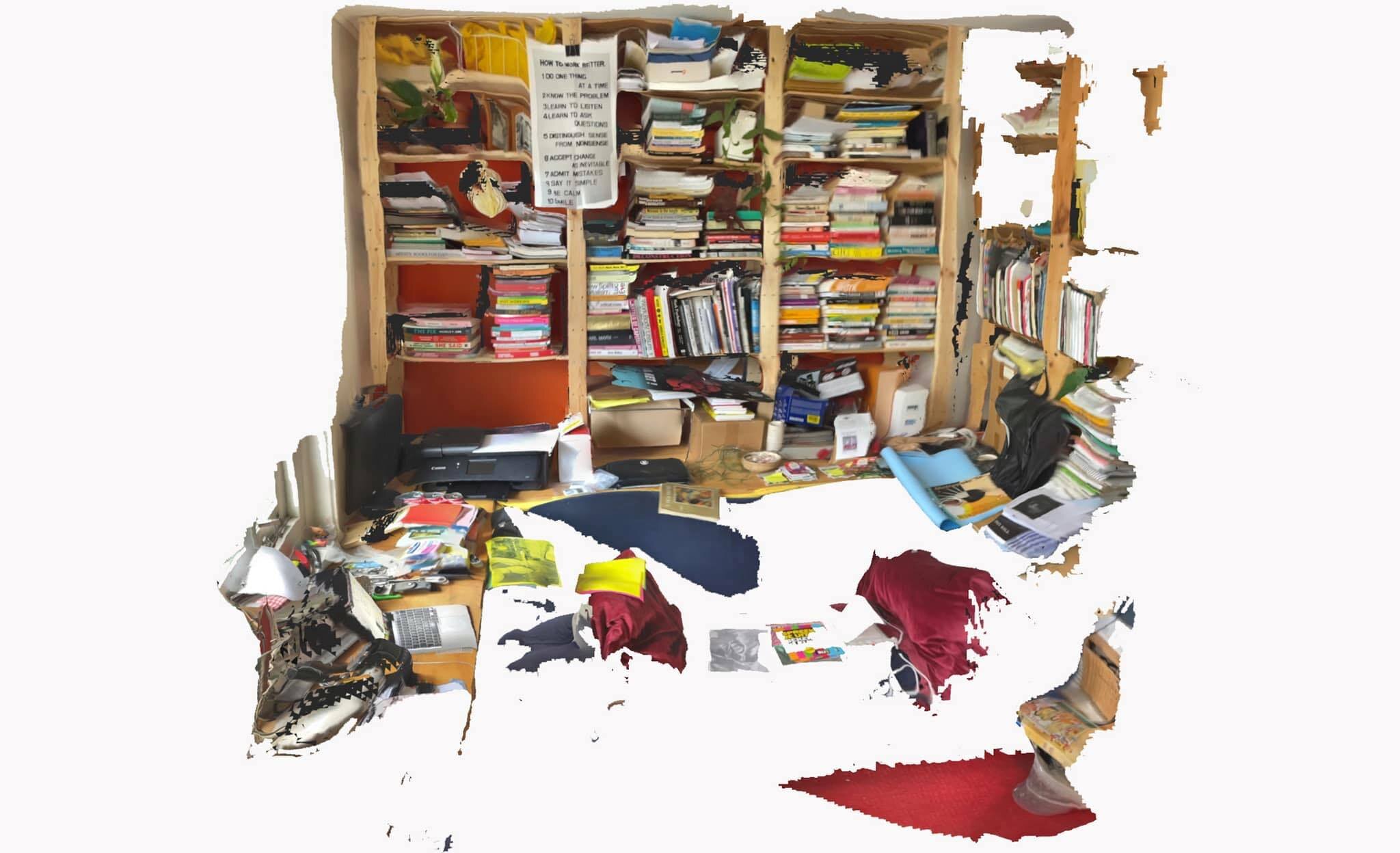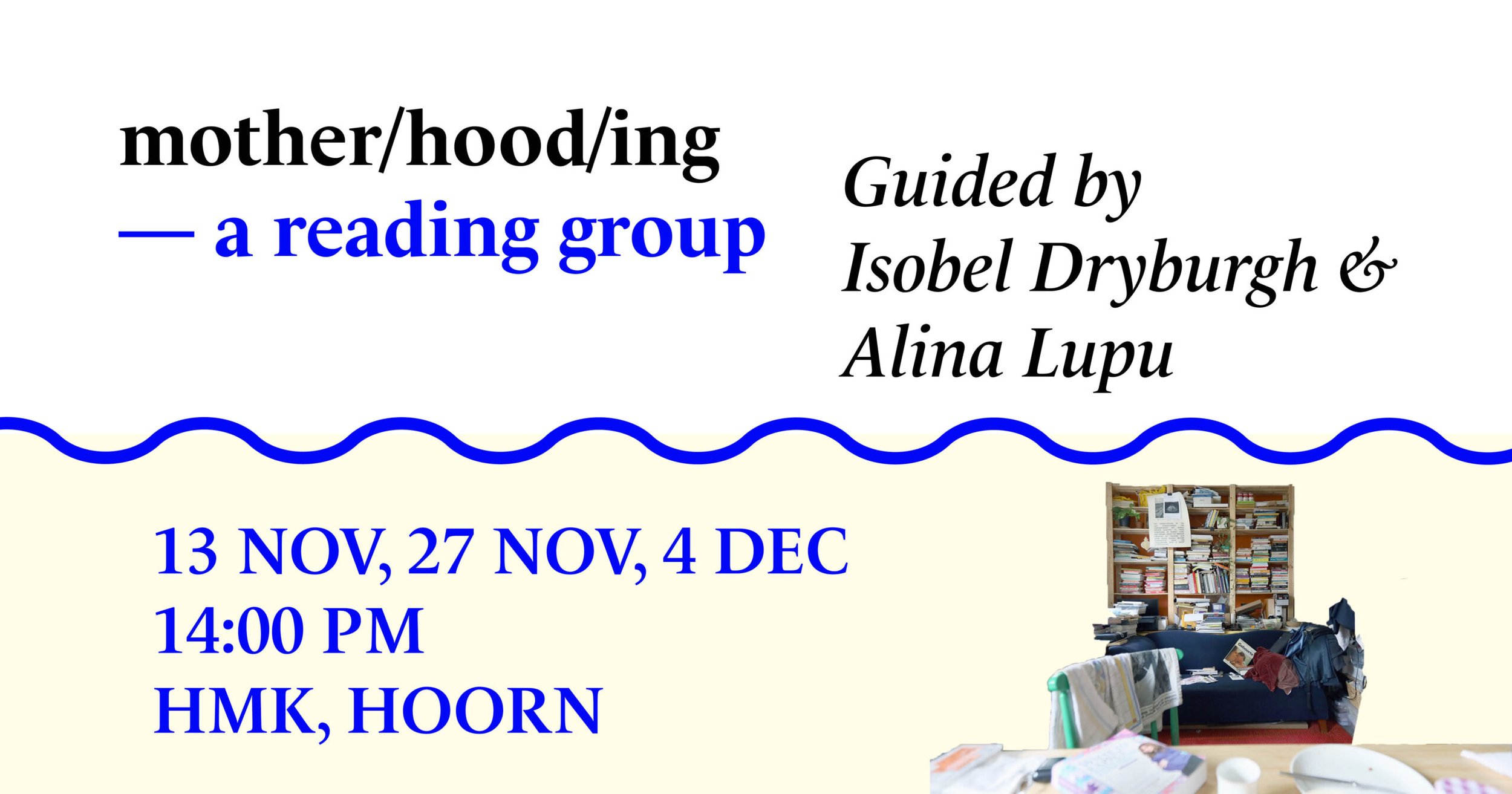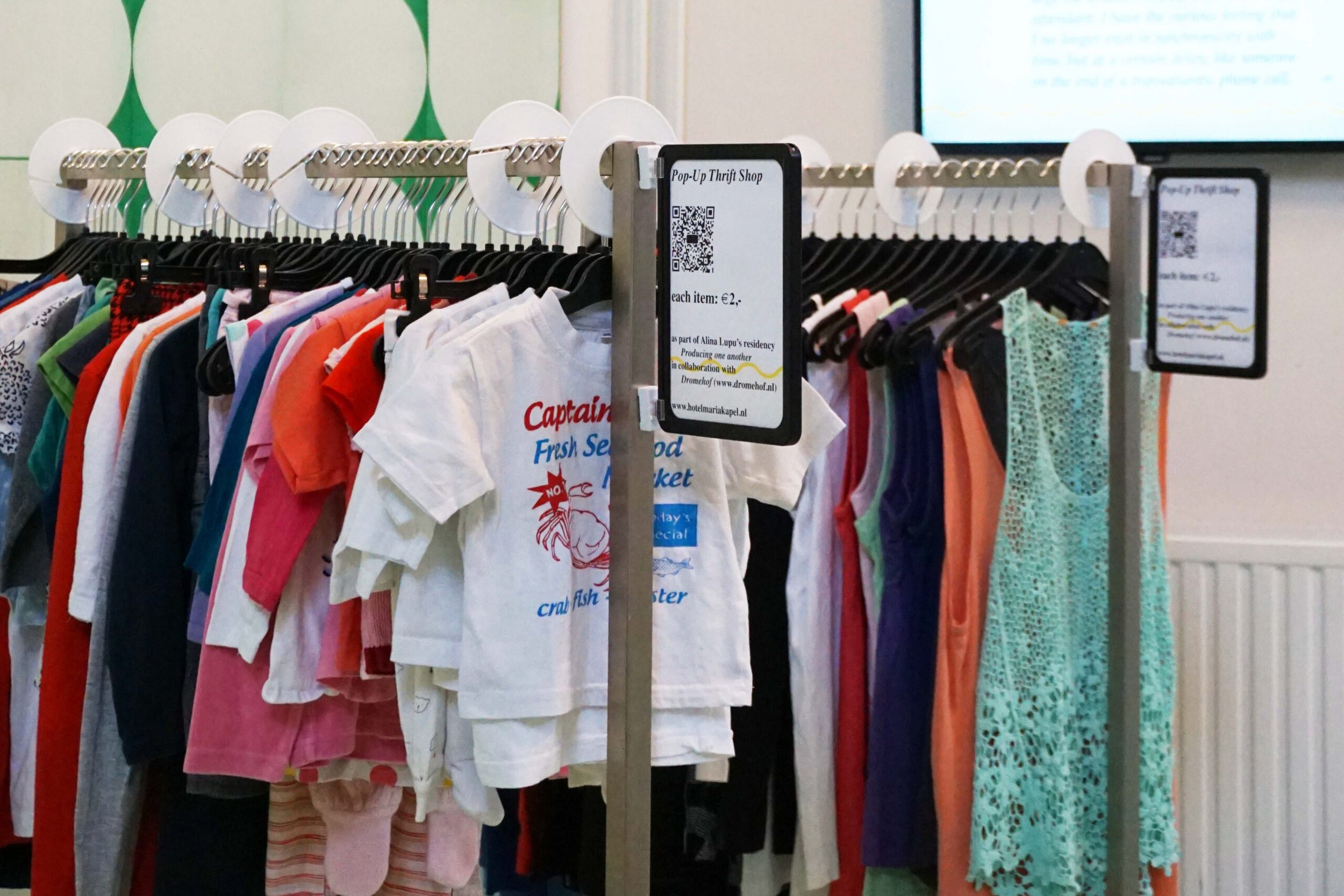
Project: Producing One Another
Kunstenaar: Alina Lupu
Residency: juli - december 2021
Art (Actuality) / History School: 22 juli 2021
Mother-hooding reading group: zaterdag 13 november, 27 november, 4 december, 2021
Pop-up thrift shop: 13 november – 18 december 2021
Mother-hood-ing Library: 14 januari 2022
Alina Lupu woont sinds 2012 in Nederland, toen ze Roemenië verliet om hier als kunstenaar opgeleid te worden en te werken. Sindsdien blijft haar tijd met haar familie beperkt tot de weinige reizen die ze maakt naar haar thuisland of wanneer haar familie haar komt bezoeken, nooit meer dan een of twee weken per keer. Voor haar residency zal Lupu haar moeder uitnodigen om met haar bij HMK te verblijven en de tijd in Hoorn te gebruiken om de band op te bouwen, te verstevigen en voort te zetten - een dialoog die begon op het moment van haar geboorte en die nu doorgaat buiten de kaders van traditionele productiviteit.
Achtergrond
“In the beginning of this year both me and my mother started engaging with new forms of non-working – I, through having lost the employment that maintains my work as an artist, and my mother due to the change in her employment status; early retirement. Neither of us ever stopped our reproductive labor, not for ourselves or for each other, even though we are now apart and no longer share the relationship of dependency we did in my early life. I have not been her provider of shelter, but she was mine.”
Alina Lupu greep de kans van het residency-format van HMK om de relatie met haar moeder te onderzoeken. In de maand juli, 9 jaar na de verhuizing van Alina naar Nederland, heeft ze haar moeder tijdelijk uit Roemenië ontworteld voor een verblijf in Hoorn, om aldaar de dialoog voort te zetten die bij haar geboorte begon.
Ze deed dit om hen beiden in staat te stellen elkaar opnieuw en op nieuwe manieren te leren kennen, met het voordeel van bijna een decennium dat sinds haar vertrek voorbijging en de 2500 km die afgelegd moest worden voor een ontmoeting. Tijdens hun residency bij HMK zullen ze nadenken over de oude manieren die hen maakten wie ze zijn als individu en in relatie tot elkaar: van traditionele arbeidsvormen tot levenslange referentiekaders, tot nationale identiteit en de vele emotionele hindernissen die moeders en dochters nemen op hun weg om elkaar voort te brengen.

Mother/hood/ing – reading group
zaterdag 13 november, 27 november, 4 december, 2021
On the occasion of Producing one another, Alina Lupu, together with Isobel Dryburgh, is organising a reading group on the topic of motherhood to run alongside the residency, and to bring it to its completion.
[This program is organised in English]
The Mother/hood/ing reading group is born out of a wish to continue reflecting on the topic which Alina’s residency Producing one another initiated. During the reading groups, Alina, together with Isobel and the participants, will dive into personal, historically relevant, and fictional texts that relate to the many meanings of being a mother, of mothering, and motherhood. Perhaps it’s good to know we are also considering mother/hood/ing beyond its traditional gender confine.
Alina and Isobel will prepare a base selection of texts, which will be shared with participants after sign-up. However, participants are invited to bring their own text suggestions. The deadline for signing up is 9 November, 2021, 23:59.
The ultimate idea is to create, within Hotel Maria Kapel, a living and ever-expanding Motherhood Library, starting off with the texts being discussed during the reading group. The library itself will be built by Harriet Rose Morley, as a structure by the end of the year, in the same style as the rest of the furniture in use at the institution. Harriet is a multi-disciplinary artist, maker, educator, and facilitator, and a previous artist in residence at HMK.
Important note:
The topic of motherhood is inherently one that touches us all. Whether we are mothers, have a mother, are feeling the absence of a mother, would like to become mothers, can’t become mothers, or think of our partners who are mothers, we move in and out of acknowledging the topic and its significance in our lives.
The Mother/hood/ing reading group is a place to share personal reactions to texts, which inherently stem from your relationship with the topic of motherhood and mothering, but don’t feel obliged to. There is no expectation or necessity to share. Always take into account your level of comfort in interacting and feel free to state your boundaries if the topic feels too close to home.
The visuals for the reading group are made by Ana-Maria Gușu, who is interning with Alina Lupu during the autumn of 2021.
Pop-Up Thrift Shop
13 november – 18 december 2021
Als onderdeel van haar residency Producing One Another installeert kunstenaar Alina Lupu een pop-up kringloopwinkel in samenwerking met liefdadigdheidsorganisatie Stichting Dromehof – gelijktijdig met de Mother/hood/ing reading groups die ze samen met Isobel Dryburgh organiseert.
Kunstenaar Alina Lupu rondt haar langetermijns-residency af met de implementatie van verschillende belichaamde reflecties die onderhandelen met, ingrijpen in, en toevoegen aan de instelling en haar activiteiten – waarbij ze elkaar zorgvuldig produceren. Met deze installatie – een Pop-Up Thrift Shop met tweedehands kleding voor elke leeftijd en gender – reflecteert Alina op moederschap en verzorging (mothering), voor onze pasgeborenen alsook voor degenen die voor ons hebben gezorgd maar sindsdien oud zijn geworden en verzorging nodig hebben.
Om de Pop-Up Thrift Shop te realiseren is Alina een samenwerking aangegaan met Dromehof, een liefdadigheidsstichting met een tweedehandswinkel in Zwaag waar alle opbrengsten gaan naar het organiseren van ondersteuningsmateriaal, evenementen en uitjes voor eenzame ouderen. Dit jaar zamelden ze geld in om robotkatten en -honden beschikbaar te stellen voor mensen met dementie, en openden ze een activiteitencentrum naast de winkel. Met de pop-up bij HMK hoopt Alina wat extra geld te kunnen distribueren naar dit goede doel, alsook ons eraan te herinneren dat we moeten omkijken naar de mensen die vroeger voor ons zorgden.
Voor meer informatie: www.dromehof.nl
–
Alina Lupu zegt: Stichting Dromehof, niet ver van HMK gevestigd, is een liefdadigheidsorganisatie die zich middels een tweedehandskledingwinkel inzet voor voor betrokkenheid en gezelschap voor ouderen. De belangrijkste motivatie om een stukje Dromehof in HMK te implementeren is sociaal: een van mijn zorgen over mijn moeder toen we in juli bij HMK samenwoonden, was haar eenzaamheid en het gebrek aan steun op haar oudere leeftijd. Het is moeilijk om een zorg van deze omvang voor mezelf op te lossen, dus met deze kleine poging zal ik proberen de zorg bij anderen op te lossen. Elk item dat in deze pop-upwinkel wordt gekocht, wordt teruggevoerd naar het Dromehof-systeem, om hun doel te ondersteunen.
Het is misschien een beetje een omweg om het waarom van een pop-up kringloopwinkel in Hotel Maria Kapel als een belichaamde reflectie te begrijpen, maar ik deel graag het volgende: er is een geweldige scène aan het einde van Rachel Cusk’s “A life’s work” die ik volledig zal citeren (in het Engels) als referentie en die me deed denken aan wat ik deed toen ik in Hoorn was, terwijl ik in residentie was met mijn moeder, en ook hoe vaak met haar rondhing in kledingwinkels, als een soort brug om onszelf te veranderen en elkaar gezelschap te houden. Hier gaan we:
“I go to London, alone, for the weekend and walk stupidly around Oxford Street in the glare of an urban summer. Everything seems weirdly futuristic, as if I had been deposited there by a time machine. I want to buy clothes, to make up for two years in which I have been as far from fashion as an anthropologist on a long field trip: but the racks of things look incomprehensible and unrelated to me, like costumes for a drama in which I no longer have a part. I lack the desire for myself that would teach me what to choose; I lack the sense of stardom in my own life that would urge me to adorn myself. I am backstage, attendant. I have the curious feeling that I no longer exist in synchronicity with time, but at a certain delay, like someone on the end of a transatlantic phone call. This, I think, is what it is to be a mother. The most terrible feeling of stress and anxiety begins to mount in me there in the shop. My heart flails in my chest with panic. I long for my child, long for her as for a sort of double, a tiny pilot boat winging young and certain up the channel ahead of me, guiding the blind, clumsy weight of me through. I go to the children’s section of a department store and stand there amidst the cribs and the baby clothes, the teddy bears and the tiny shoes, and I feel alleviated, rescued, plugged into a source of life.
All day I have heard babies crying, faint threads of distress from elsewhere borne past me on the air, and each time I have felt a fine quiver of response, razor-sharp, immediate, and have had to steel myself not to look around. A baby begins to cry there in the children’s department, not six feet from me. It is the raw, tiny cry of someone only a few days old. I look up and see the pram, the mother frantically jiggling it with one hand while raking through racks of baby clothes with the other, her face a fist of concentration. She is debating something in urgent tones with the older woman – her mother – standing next to her. The baby’s cries are fast with barely a beat between them. I know that this means the woman has less than a minute to choose and purchase an outfit, but her mother disagrees with her choice and is remonstrating with her. I can see by the way she moves that her body is still stunned with childbirth. Go home, I think. Go home. Wrap the baby in a tea-towel, she won’t care. Just give in and go home. She doesn’t give in. She has an image of this shopping expedition and she is clinging to it with sharp teeth. She can’t bear something to go unresolved, unfinished, for she fears that nothing will ever be resolved again. She’s trying to keep up, to stay in time, but she’s swimming against a powerful current. I see her steal looks at her mother, brimming with longing and confusion, and hurt. After all these years she has discovered her mother’s secret and it is somehow disappointing, a let-down, for she is in those first days of her parturition both mother and child, and the passionate emotion she feels for her vulnerable self finds no reflection in her own mother’s disapproval, her compassionless urge to dispute. Years of human politics have adhered to her mother’s heart: they hang from it like stalactites, like moss. Her own heart is new, raw, frantically pulsing. Will time turn it, too, unfeeling?
The baby cries and cries; and it is all I can do to not lift it from its pram and hold its small, frightened body close against my chest, hold it and hold it until it stops, so certain am I that it would, that it would know that I knew, and be consoled.”

Bio: Alina Lupu
Alina Lupu is een in Roemenië geboren en getogen, in Nederland wonende post-conceptuele kunstenaar en schrijver. De focus van haar praktijk ligt op precaire leef- en werkomstandigheden voor kunstwerkers en arbeiders in het algemeen. In september 2020 trad ze toe tot de programmacommissie van Kunsthuis Syb in Beesterzwaag en is ze recent bestuurslid van Platform BK, waar ze zich inzet voor het verbeteren van de positie van (internationale) kunstenaars en het stimuleren van het publieke debat over de rol van beeldende kunst in de samenleving. Gedurende de maand juli 2021 verblijft Alina samen met haar moeder Valy in Hotel Maria Kapel, waar ze samen zullen nadenken over de betekenis van het produceren van elkaar.
Art (History) Actuality School: Soft resistance, hard resistance.
Walks, queering, squatting, something to hold on to, and the neoliberal turn.
Donderdag 22 juli 2021, 19:30-21:00 uur.
Een interactieve kunstgeschiedenis, danwel een actualiteit– lezing door artist in residence Alina Lupu, reagerend en voortbordurend op de tentoonstelling Missing Homes, gecureerd door Danai Giannoglou, met Arie de Fijter, Sarah Naqvi, Paky Vlassopoulou, Shreya de Souza, en Mylou Oord als organisatoren van Queer Choir Amsterdam samen met Sarah Naqvi, en Setareh Noorani & Matt Plezier (SMET).
Door middel van vrije associaties en het leggen van verbanden met hedendaagse gebeurtenissen, bevraagt Alina waar we momenteel bewijzen van weerstand kunnen vinden met betrekking tot de notie van onderdak en institutionele kaders, en hoe deze bewijzen van weerstand zich manifesteren. De werken in de tentoonstelling Missing Homes zullen fungeren als de startpunten die het gesprek zullen leiden.







